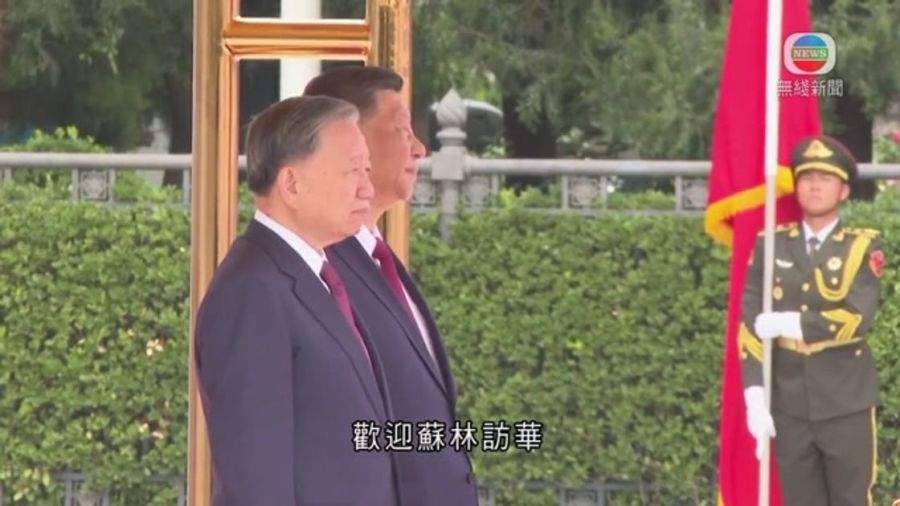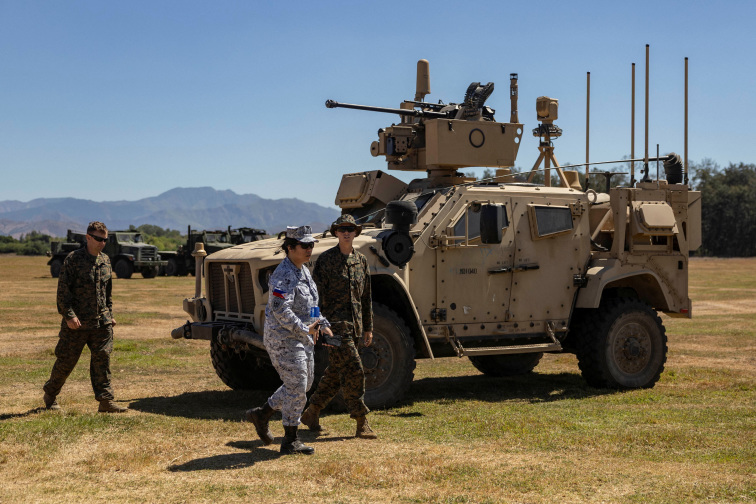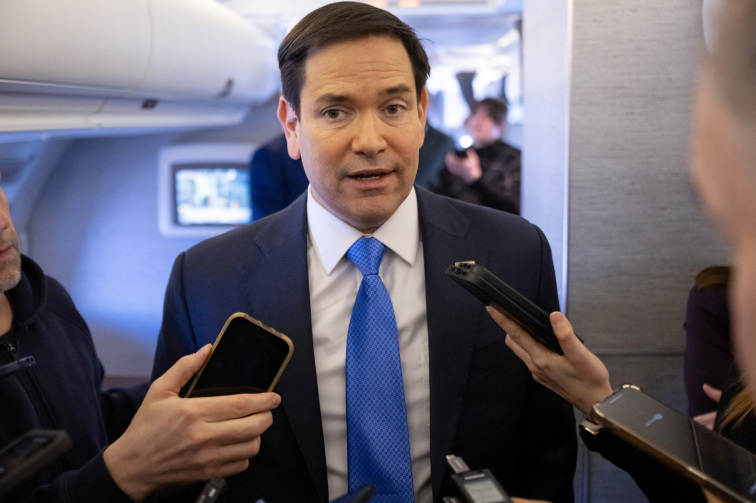Vietnam’s newly appointed General Secretary and President, To Lam, visited China from August 18 to 20 at the invitation of Xi Jinping. (Video screenshot)
[People News] According to a report by the Central Television of the Communist Party of China, on the morning of April 23, Xi Jinping hosted a welcoming ceremony at the Great Hall of the People in Beijing for Azerbaijani President Ilham Aliyev, who was on a state visit to China. CCTV notably pointed out that this was the first implementation of the new state visit welcoming ceremony.
The reports indicate that the recent changes in the welcoming ceremony for foreign dignitaries are primarily evident in the military band, flag team, and salute guns. Specifically, the military band has been relocated from the south side to the north side, with the previous two groups of 122 members consolidated into a single group of 82; the buglers' uniforms have shifted from red to military green ceremonial attire; the flag formation on the north side has been eliminated; the flag team has been reduced from 26 flags to 22; and the decibel level of the salute guns has been decreased from 99 decibels to 89, with the amount of gunpowder reduced from 30 grams to 10 grams.
In summary, the new changes focus on 'reduction.' The number of honour guard members in the new welcoming ceremony for foreign dignitaries has been cut down, the number of flags has been reduced, the gunpowder in the salute guns has been lessened, and the buglers' uniforms have transitioned from red to green. This shift serves as further evidence of the Communist Party leader's loss of diplomatic leadership.
Since the news of Xi Jinping's stroke emerged after the Third Plenary Session in July last year, there have been increasingly clear signs of his power being diminished and stripped away within both the military and the party. Alongside the repeated purges of Xi's trusted aides in the military, the recent reshuffle between Li Ganjie, the Minister of Organisation, and Shi Taifeng, the Minister of United Front Work, is interpreted as a signal that Xi is losing control over personnel decisions. Additionally, since the recent two sessions of the Communist Party, Xi's foreign affairs activities have noticeably decreased. At the Central Peripheral Work Conference held on April 8, the complete absence of 'Xi Jinping Thought on Diplomacy' raised suspicions about Xi's diminishing authority in foreign affairs.
On April 10, the Ministry of Foreign Affairs of the Communist Party convened its annual work conference for foreign envoys in Beijing. Wang Yi, a member of the Political Bureau and the Foreign Minister, attended and delivered a speech. However, Xi Jinping, who has historically placed great emphasis on diplomacy, did not meet with as many attending foreign envoys as he typically would have in the past, which is quite unusual.
Another notable deviation was that Wang Yi did not include the customary phrases such as 'guided by Xi Jinping Thought on Diplomacy' in his remarks, marking a significant departure from previous meetings. This further supports the notion that Xi is no longer able to dominate foreign affairs as he once did. The recent changes in the protocol for welcoming state guests, which were formally explained by CCTV, raise the question of whether this suggests Xi has lost his grip on foreign affairs.
According to the Communist Party's narrative, 'there are no small matters in diplomacy,' and the reception work serves as 'the business card of the national image.' The welcoming and sending-off ceremonies encompass various elements such as transportation security, the firing of salutes, and the review of the honour guard, making it one of the most ceremonial and significant aspects of diplomatic receptions.
Following the Cultural Revolution, the Chinese Communist Party (CCP) relocated the welcoming ceremony for state guests from the airport and train station to the square outside the East Gate of the Great Hall in 1980. In 1981, the motorcade escort for state guests was reinstated, and in 1983, the ceremonial guard's parade performance was resumed. The firing of salutes was reintroduced in 1984, adhering to international standards regarding the number of cannon shots. By 1989, the practice of involving children and youth in welcoming and sending off foreign leaders was discontinued. In November 2002, the firing of salutes during indoor welcoming ceremonies was eliminated, and in January 2004, the motorcade escort for state guests was abolished. Finally, in March 2012, the arrangements for personnel welcoming leaders at the airport were simplified once again.
It is evident that during Hu Jintao's tenure, the welcoming ceremonies for state guests were largely in line with international practices and were not overly extravagant. However, after Xi Jinping assumed power in 2012, new changes began to emerge in the ceremonial protocols, which are closely linked to Xi's foreign policy.
At the Central Foreign Affairs Work Conference in 2014, Xi emphasised that "China must have its own distinctive major power diplomacy." Following this, the CCP's Protocol Department developed new specifications and rituals for diplomatic ceremonies, focusing on what they termed the "major power style, major power demeanour, and major power characteristics." According to the CCP, "the diplomatic protocol work since the 18th National Congress has prominently showcased Xi Jinping's diplomatic style."
Indeed, over the past decade, the ceremonial protocols and standards of the Chinese Communist Party (CCP) have seen significant changes. For instance, in 2013, the welcome ceremony for state visits reintroduced youth and children’s teams and included the playing of a welcoming horn for the first time. In 2014, the honour guard of the three armed forces at the welcome ceremony incorporated female soldiers for the first time, and the military band added a marching performance, with their ceremonial uniforms being red. That same year, the motorcade escort for state guests was reinstated. In 2018, the arrival route for foreign guests and hosts was modified, with flag-bearing honour guards added along the route. The welcome ceremony also saw an increase in the number of trumpet performances, the addition of female soldier formations, and improvements to the military band’s formation, among other changes.
During Xi San's (Xi Jinping's) administration, the ceremonial protocols characterised by 'grandeur' and 'ostentation' reflect a level of extravagance. While countless Chinese citizens struggle to make ends meet, the CCP allocates substantial public resources to these superficial displays that serve little purpose. How much genuine recognition can they expect to gain from the international community?
Currently, the etiquette for welcoming state guests is undergoing another transformation, with a trend towards 'reduction.' Does this suggest that Xi's grand diplomatic style is being set aside? If so, does Xi still maintain control over foreign affairs? △
(First published by the People News)










News magazine bootstrap themes!
I like this themes, fast loading and look profesional
Thank you Carlos!
You're welcome!
Please support me with give positive rating!
Yes Sure!